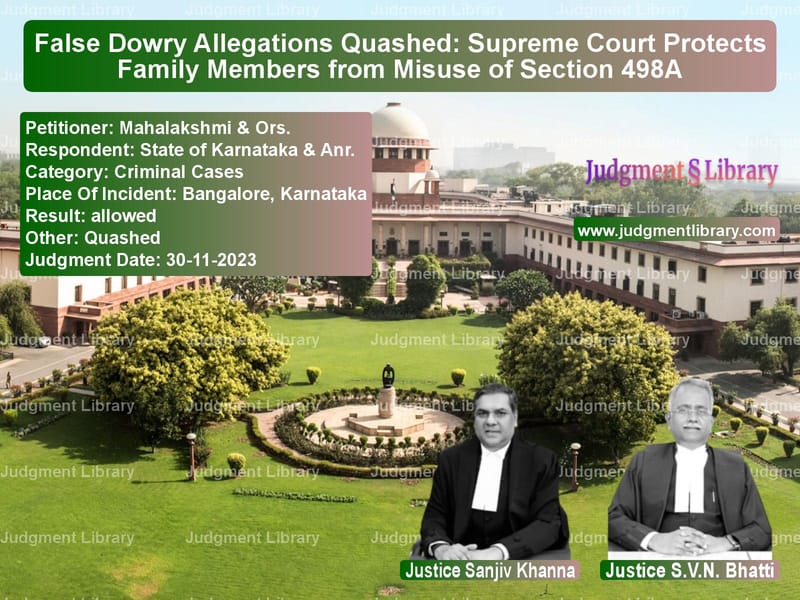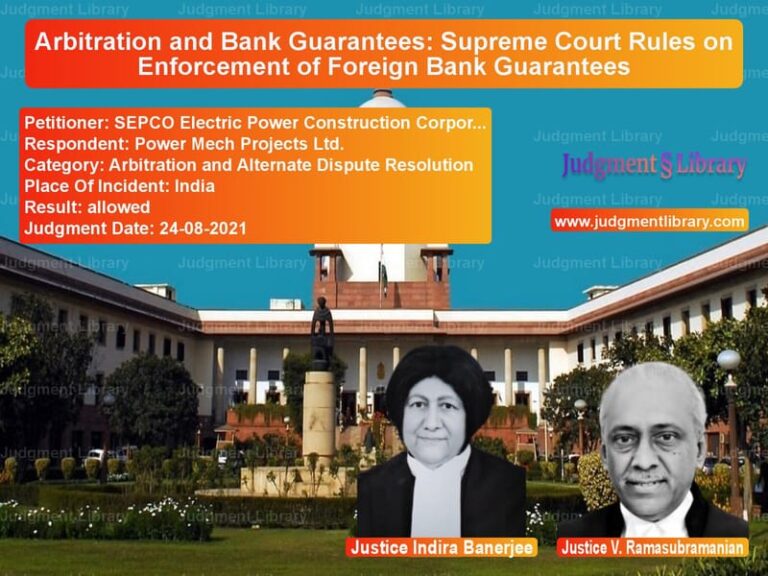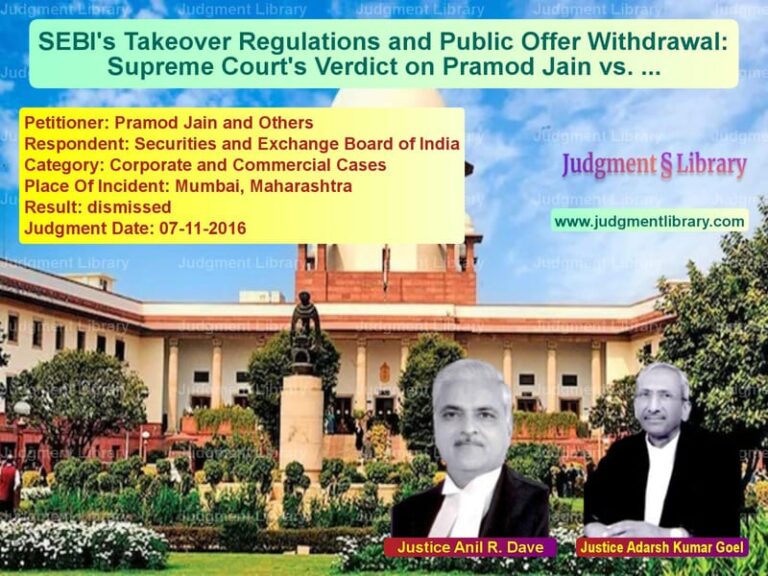False Dowry Allegations Quashed: Supreme Court Protects Family Members from Misuse of Section 498A
The case of Mahalakshmi & Ors. vs. State of Karnataka & Anr. revolves around allegations of cruelty under Section 498A of the Indian Penal Code (IPC) and the Dowry Prohibition Act, 1961. The Supreme Court examined whether distant relatives of the husband could be implicated in a dowry harassment case without concrete evidence. The Court quashed the charges against the petitioners, highlighting the growing misuse of Section 498A IPC and setting a precedent for protecting innocent family members.
Background of the Case
The dispute began after the marriage of Rekha Bhaskaran and Sarvan Kumar on June 29, 2015. On November 26, 2016, Rekha Bhaskaran filed an FIR No. 92/2016 at Halasurgate Women Police Station, Bangalore, alleging cruelty and dowry harassment against her husband and his relatives, including:
- Mahalakshmi (Appellant No.1) – Sister of the husband, residing in Canada.
- Maharani T.S. (Appellant No.2) – A cousin, living in Secunderabad, Telangana.
- Ranjanavadhan (Appellant No.3) – Another cousin.
- Archana (Appellant No.4) – Wife of Ranjanavadhan.
The FIR invoked Sections 498A (cruelty by husband or relatives), 506 (criminal intimidation) of the IPC, and Sections 3 and 4 of the Dowry Prohibition Act, 1961. A charge sheet was filed on July 20, 2017, summoning all accused, including the petitioners.
Read also: https://judgmentlibrary.com/supreme-court-upholds-high-courts-acquittal-in-27-year-old-murder-case/
Petitioner’s Arguments
The appellants, Mahalakshmi and others, contended:
- The allegations were vague and general, with no specific instances of cruelty mentioned.
- Mahalakshmi had been residing in Canada since 2013 and only visited India twice for short durations, making it impossible for her to have committed the alleged offenses.
- The other appellants lived separately in different states and did not interfere in the couple’s marital life.
- The only allegations against Mahalakshmi were that she commented on Rekha’s physical appearance and allegedly threw some of her belongings on the ground, which did not constitute cruelty under Section 498A IPC.
- Regarding Maharani T.S., Ranjanavadhan, and Archana, the only claim was that they attended a panchayat to mediate the couple’s marital dispute, which cannot be considered an offense.
Respondent’s Arguments
The State of Karnataka and the complainant, Rekha Bhaskaran, countered:
- The charge sheet established that the accused were involved in harassing the complainant.
- Mahalakshmi, despite living abroad, interfered in her brother’s marital life.
- The panchayat held by the other appellants was meant to pressure the complainant into staying in the marriage.
- The FIR was registered based on a written complaint, which contained sufficient material for the prosecution to proceed.
Key Legal Issues Considered
1. Misuse of Section 498A IPC
The Court examined whether vague allegations without specific incidents could justify criminal proceedings against distant relatives.
2. Territorial and Personal Jurisdiction
The Court considered whether Mahalakshmi, living in Canada, and Maharani T.S., residing in Telangana, could be prosecuted for incidents allegedly occurring in Bangalore.
3. Applicability of Previous Precedents
The Court referenced judgments, including:
- Arnesh Kumar vs. State of Bihar (2014) 8 SCC 273: Highlighting the misuse of Section 498A IPC and the need for strict scrutiny before arrest.
- Rajesh Sharma vs. State of Uttar Pradesh (2018) 10 SCC 472: Requiring the police to conduct a preliminary inquiry before registering an FIR under Section 498A IPC.
Supreme Court’s Verdict
The Supreme Court ruled in favor of the appellants, making the following observations:
- The allegations were general, vague, and lacked specific instances of cruelty, making it improper to prosecute the accused.
- Mahalakshmi’s residence in Canada and her brief visits to India did not provide sufficient grounds for her inclusion in the case.
- The mere presence of relatives in a panchayat (community meeting) does not constitute criminal liability.
- The lack of direct allegations against the accused rendered their prosecution an abuse of legal process.
- The Court quashed the criminal proceedings but allowed the trial court to invoke Section 319 CrPC in case new material evidence emerged.
Key Takeaways from the Judgment
- Vague Allegations Cannot Justify Criminal Prosecution: Courts require clear and specific instances of cruelty for a case under Section 498A IPC.
- Relatives Living Separately Are Not Automatically Liable: Merely being related to the husband does not make one complicit in domestic violence.
- Judicial Scrutiny of Section 498A IPC Cases: Courts must ensure that false cases do not lead to the harassment of innocent family members.
- Preserving the Integrity of Dowry Laws: This judgment reinforces that while dowry harassment cases must be taken seriously, misuse of the law must be prevented.
This ruling is a significant step in preventing the misuse of Section 498A IPC while ensuring that genuine cases of domestic abuse are not undermined.
Petitioner Name: Mahalakshmi & Ors..Respondent Name: State of Karnataka & Anr..Judgment By: Justice Sanjiv Khanna, Justice S.V.N. Bhatti.Place Of Incident: Bangalore, Karnataka.Judgment Date: 30-11-2023.
Don’t miss out on the full details! Download the complete judgment in PDF format below and gain valuable insights instantly!
Download Judgment: mahalakshmi-&-ors.-vs-state-of-karnataka-&-supreme-court-of-india-judgment-dated-30-11-2023.pdf
Directly Download Judgment: Directly download this Judgment
See all petitions in Domestic Violence
See all petitions in Dowry Cases
See all petitions in Judgment by Sanjiv Khanna
See all petitions in Judgment by S.V.N. Bhatti
See all petitions in allowed
See all petitions in Quashed
See all petitions in supreme court of India judgments November 2023
See all petitions in 2023 judgments
See all posts in Criminal Cases Category
See all allowed petitions in Criminal Cases Category
See all Dismissed petitions in Criminal Cases Category
See all partially allowed petitions in Criminal Cases Category







